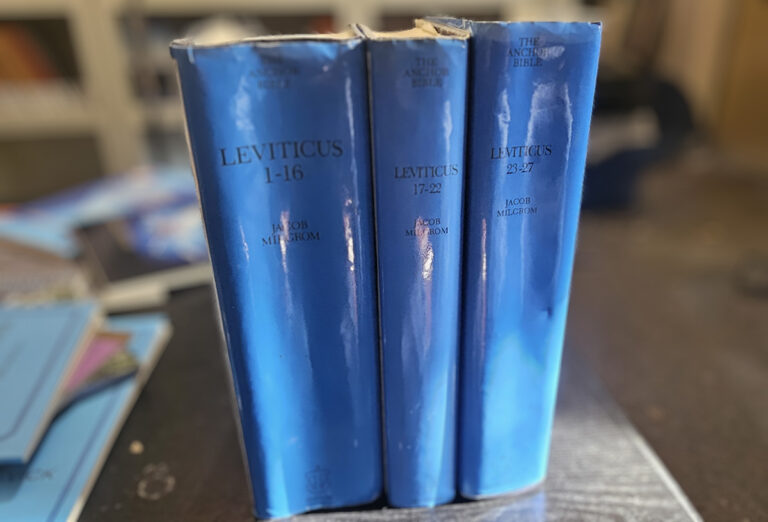Isaiah 53: A Short Note on the Suffering Servant
Yesterday Adrian was apparently surprised that anyone would question that the suffering servant of Isaiah 53 (or better, Isaiah 52:13-53:12) was Jesus. He said:
The answer to the first question is very straightforward if you believe the bible is without error and Jesus can be trusted. For he himself tells us who the prophet is speaking of –
Luke 22:37 For I tell you that this Scripture must be fulfilled in me: ‘And he was numbered with the transgressors.’ For what is written about me has its fulfillment.”
So, can we now all accept that Isaiah 53 is about Jesus? Jesus himself might not have had a theological degree, but I do think we should take his exegesis seriously!
Further, he is amazed that anyone could think that this passage was not about substitution:
Now, as far as question 2 goes, I simply cannot see how Isaiah 53 can possibly be stripped of the idea of punishment and substitution. Dave Warnock claimed in this comment section to have found commentaries that disagree. . . .
Let me look at these points in reverse. I quite agree that the ideas both of substitution (though I think it can be better expressed) and of punishment occur in Isaiah 53. There actually have been commentaries that claim that those concepts do not occur, but I am only aware of them by citation (and refutation) in Childs (Isaiah in the OTL), and Childs disposes of them pretty quickly.
My question would be, “What of it?” I have thought that the ideas of substitution and punishment were present in Isaiah 53 since I can remember, but that doesn’t make the chapter support penal substitutionary atonement as it is being argued currently. If all folks want to prove is that the ideas of “substitution” and “punishment” occur in the Bible, I can concede their point. But it seems that they want me to buy the entire doctrine based on the presence of a couple of concepts.
Since I believe that penal substitution is one valid expression of the atonement, I am scarcely surprised to find it in scripture. But thus far every person with whom I have debated this point has been unsatisfied with my calling PSA “one valid expression.” They want this one metaphor to be the sole expression. That is a narrowing of doctrine that I reject.
So let me start by saying that both the ideas of substitution and punishment can be found in Isaiah 53. There are some additional points that I think should be emphasized, but they will only broaden the picture, not eliminate the concepts.
So let me turn back to the question of whether this is Jesus. I’m going to try to abbreviate my comments, so please forgive me (and chastise me in comments) if I fail to cover all points. Traditionally there have been two extremes in the interpretation of Isaiah 53. The first is the more or less standard Christian view that this is a prophecy, or more precisely a predictive prophecy of the suffering, death, and resurrection of Jesus. I’m referring to a simple, one-to-one relationship. Isaiah was talking specifically and exclusively about Jesus and Jesus specifically and exclusively fulfilled the prediction. The other extreme views the suffering servant as Israel collectively, suffering for their sins and the sins of the world in general, yet redeemed by God and restored.
Informed readers will be able to point out difficulties with these interpretations very quickly. Isaiah 45:4 stands against the identification with Jesus by identifying the servant directly at Israel. Many interpreters see Isaiah 49:1-3 as a narrowing of this concept specifically to the prophet (or someone of whom he spoke) individually as a representative of Israel. In objection to understanding Israel as the servant one can present Isaiah 53:9 “done no violence” and “no deceit in his mouth.” It hardly seems likely that someone in the prophetic tradition would present Israel as totally innocent.
There is an intermediate position (in fact, more than one, but I don’t want to write a small book here), which sees the servant firstly as the (reformed) remnant of Israel. In this case, the exiles, who will eventually be restored to Judea become the servant, despised by the remainder of the people (Ezekiel 11:1-13). This leaves us with not precisely substitution but a form of representative suffering, in which a small group suffers for a larger group. This concept would have been easier to comprehend in the ancient world, which was less individualistic. We think of offenses and punishments as personal things. I sin, Jesus dies for me, I am saved from sin. In that formulation there is no representative suffering; there is a simple swap. But we should take seriously the words of Hebrews 2:10-15 where Jesus is said to be perfected through suffering, and to be made “of one stock” (REB) with his brothers and sisters. This intermediate position is then completed with the identification of Jesus as the ultimate representative of Israel.
Let me quote Wolf (Interpreting Isaiah: The Suffering and Glory of the Messiah, p. 215):
The suffering and salvation of the nation led Isaiah to his fullest disclosure of the suffering and exaltation of the Servant, who is “Israel” par excellence. The fourth Servant Song describes the meaning of the death of Christ and its significance for a sinful world. . . .
Now I’m not quoting Wolf in support of every element of my interpretation, but specifically in connecting the servant of the early songs, clearly identified as Israel, with the servant of Isaiah 53, with characteristics that are not as applicable.
Here I would like to note my problems with Adrian’s approach of simply telling us that Jesus said it and we should respect Jesus’ exegesis. First, this approach is fairly weak if one is going to ever dialog with a non-Christian. Acts 8:26ff tells the story of the Ethiopian eunuch, which Adrian also references. Imagine if Philip used that approach. “You’re reading Isaiah 53? Well, there’s this guy who lived in Judea, and he said this applied to him.” I’m suspecting Philip’s approach was slightly more complex than that. If Jesus provided a good exegesis, one would hope a good exegete could provide an explanation.
But second, I think that approach rips Isaiah 53 out of its context in Isaiah and loses us part of the understanding. If we start with the idea of Israel as God’s servant–a role to which they were called–we can then take the single step to the remnant who suffer, but not merely for their own transgressions. Many of them were simply in the wrong place at the wrong time.
Yet even a quick read of Isaiah 53 will leave you dissatisfied with that solution. Perhaps we’re talking about one heroic figure, contemporary with the prophet if one sees this as an exilic 2nd Isaiah (40-55), or someone amongst the exiles, to which most of the passages are primarily addressed. That is a useful idea, but nonetheless I don’t think it fully fulfills the promise of the passage.
Both of those concepts, however, provide some context for the type of suffering which befell the ultimate servant. Just as the exiles receive God’s punishment from a foreign power that is God’s agent, so Jesus is crucified by the Romans. Just as the exiles were despised by those not taken, so Jesus is handed over for that punishment by his own people. The redemption is accomplished by God’s action exalting his servant and redeeming the many.
I feel quite a lot like someone who has attacked a several acre field with a small garden hoe, but I’ll leave it at that. Let me commend to you both of the books (Wolf and Childs) that I have quoted in their comments on the servant songs. They provide a good survey and basis for further research.

